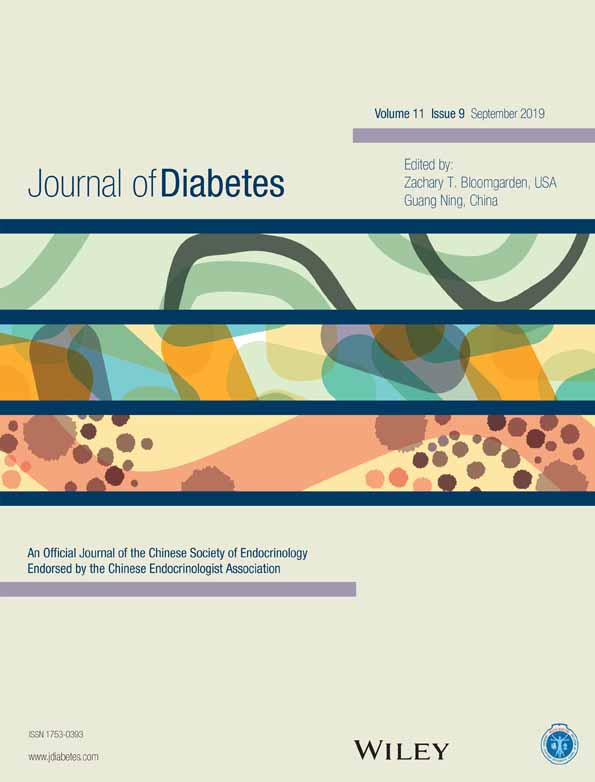Serum apolipoprotein B is associated with increased risk of metabolic syndrome among middle-aged and elderly Chinese: A cross-sectional and prospective cohort study
血清载脂蛋白B与中国中老年人代谢综合征风险增加相关:一项横断面和前瞻性队列研究
Funding information Ministry of Science and Technology of the People's Republic of China, Grant/Award Number: 2016YFC1305202; National Natural Science Foundation of China, Grant/Award Number: 81670795; Shanghai Municipal Education Commission, Grant/Award Numbers: 15SG15, 20152202; Shanghai Sailing Program, Grant/Award Number: 18YF1419900
Abstract
enBackground
Serum apolipoprotein (apo) B has been associated with an increased risk of atherosclerotic cardiovascular diseases. However, findings on the association between apoB and the risk of metabolic syndrome (MetS) are inconsistent. The purpose of this study was to investigate the association between serum apoB and MetS risk in Chinese population.
Methods
A baseline survey was conducted in a population-based cohort of 10 340 adults aged ≥40 years in Shanghai, China, in 2010. A follow-up visit was conducted to assess incident diabetes in 2015.
Results
At baseline, 2794 of 10 340 participants (27.02%) had MetS. Serum apoB was significantly associated with an increased risk of prevalent MetS. Multivariable-adjusted odds ratios and 95% confidence intervals (CIs) for quintiles 2-5 compared with quintile 1 (reference) were 1.29 (1.02-1.63), 1.47 (1.18-1.84), 1.32 (1.06-1.65), and 2.02 (1.61-2.51), respectively (Ptrend < 0.05). During an average of 5.1 years follow-up, 4627 individuals without MetS at baseline showed a significant association between apoB and the risk of incident MetS. Multivariable-adjusted risk ratios (95% CIs) for subjects in apoB quintiles 2-5 compared with the reference were 1.43 (1.13-1.82), 1.57 (1.25-1.98), 1.74 (1.38-2.18), and 2.07 (1.66-2.58), respectively (Ptrend < 0.05). Stratified analysis suggested that the above association was much stronger among normal weight individuals than in those who were overweight or obese.
Conclusion
These cross-sectional and prospective studies provide evidence that serum apoB is associated with existing MetS and is a possible predictor of the risk of MetS, especially among normal weight individuals.
Abstract
zh摘要
背景
既往研究表明血清载脂蛋白B(apolipoprotein B, apoB)与动脉粥样硬化性心血管疾病的风险增加相关。但有关血清apoB与代谢综合征(metabolicsyndrome, MetS)风险的研究结果尚不一致。本研究旨在探讨中国社区人群血清apoB与MetS风险之间的关系。
方法
本研究共纳入10340名来自上海的40岁以上的社区人群, 于2010年进行了基线调查, 并在2015年完成了随访调查并收集糖尿病的信息。
结果
在基线时, 10340名研究对象中有2794(27.02%)人患有MetS。血清apoB与MetS患病风险增加显著相关。与血清apoB最低分位者相比, 第2-5分位者其多元校正后的比值比(odds ratio, OR)和95%置信区间(confidence interval, CI)分别为1.29(1.02-1.63), 1.47(1.18-1.84), 1.32(1.06-1.65)和2.02(1.61-2.51)(趋势P值< 0.05)。经过平均5.1年的随访, 在4627名基线无MetS的研究对象中, 血清apoB与MetS发病风险增加显著相关。与血清apoB最低分位者相比, 第2-5分位者的多元校正OR(95% CI)分别为1.43(1.13-1.82), 1.57(1.25-1.98), 1.74(1.38-2.18)和2.07(1.66-2.58)(趋势P值< 0.05)。分层分析表明, 与超重或肥胖者相比, 上述相关性在正常体重者中更强。
结论
我们的横断面和前瞻性研究提供了血清apoB升高与MetS风险增加相关的证据, 提示血清apoB能够一定程度上预测MetS的发生风险, 尤其是在正常体重的个体中。




